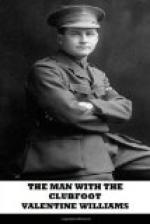“You mean the south entrance?” he asked, and proceeded to give me directions which brought me, without further difficulty, out upon the open space in front of the great equestrian statue of the Emperor William I.
It was a clear, starry night and I heaved a sigh of relief as I saw the Schloss-Platz glittering in the cold light of the arc lamps. So pressing had been the danger threatening me that the atmosphere of the Castle seemed stifling in comparison with the keen night air. A new confidence filled my veins as I strode along, though the perils to which I was advancing were not a whit less than those I had just escaped. For I had burnt my boats. My disappearance from the Castle must surely arouse suspicion and it was only a matter of hours for the hue and cry to be raised after me. At best it might be delayed until Clubfoot presented himself at the Castle.
I could not remain in Berlin, that was clear. My American passport was not in order, and if I were to fall back upon my silver badge, I should instantly come into contact with the police with all kinds of unwelcome consequences. No, I must get out of Berlin at all costs. Well away from the capital, I might possibly utilize my silver badge or by its help procure identity papers that would give me a status of some kind.
But Francis? Baffled as I was by that obscure jingle of German, something seemed to tell me that it was a message from my brother. It was dated from Berlin, and I felt that the solution of the riddle, if riddle it were, must be found here.
I had reached Unter den Linden. I entered a cafe and ordered a glass of beer. The place was a blaze of light and dense with a blue cloud of tobacco smoke. A noisy band was crashing out popular tunes and there was a loud buzz of conversation rising from every table. It was all very cheerful and the noise and the bustle did me good after the strain of the night.
I drew from my pocket the slip of paper I had had from Dicky and fell to scanning it again. I had not been twelve hours in Germany, but already I was conscious that, for anyone acting a part, let anything go wrong with his identity papers and he could never leave the country. If he were lucky, he might lie doggo; but there was no other course.
Supposing, then, that this had happened to Francis (as, indeed, Red Tabs had hinted to me was the case) what course would he adopt? He would try and smuggle out a message announcing his plight. Yes, I think that is what I myself would do in similar circumstances.
Well, I would accept this as a message from Francis. Now to study it once more.
O Eichenholz! O Eichenholz!
Wie leer sind deine Blaetter.
Wie Achiles in dem Zelte.
Wo zweie sich zanken
Erfreut sich der Dritte.
The message fell into three parts, each consisting of a phrase. The first phrase might certainly be a warning that Francis had failed in his mission.




